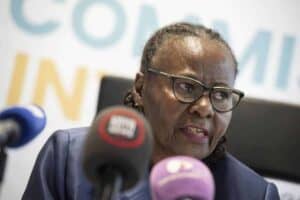The Sisi Khampepe-led inquiry into alleged political interference in TRC cases will hold a prehearing meeting to chart the way forward for the inquiry.

The judicial commission of inquiry into into allegations of attempts to impede the investigation or prosecution of Truth and Reconciliation Commission (TRC) cases has invited interested parties to attend a prehearing meeting in the coming weeks.
The inquiry, chaired by retired Constitutional Court Judge Sisi Khampepe, will host a pre-hearing meeting to agree on a programme for the conduct of the inquiry’s work and set a timeline for all the procedural steps.
Inquiry invites public to prehearing session
Addressing the media on the developments since it was established by President Cyril Ramaphosa in May, Khampepe said the meeting is an important consultative gathering that will happen within the next three weeks.
“All interested persons and institutions are invited to register their interest to attend this meeting by sending an email to [email protected] by no later than Monday, 25 August 2025.”
The inquiry will look into allegations made by 23 families in pending High Court proceedings that there has been political interference in TRC cases.
At the start of democracy, the TRC was established to address apartheid violence, promote reconciliation, uncover human rights violations and allow individuals to seek amnesty.
Mandate of the Khampepe commission
“It is the task of this inquiry to uncover the facts about these matters, in particular about where there was political interference that impeded the attainment of justice for the victims and their families,” Kahampepe said.
She said the inquiry – co-commissioned by retired Northern Cape Judge President Frans Diale Kgomo and Advocate Andrea Gabriel – is also tasked with making recommendations about what measures should be taken against those found to be responsible.
“It is in the interest of justice that the victims and their families must find closure in this process. Where prosecution is competent, those perpetrators must be brought to book,” Khampepe said.
“Despite a period and exceeding two decades, there has, however, been insufficient investigation and prosecution.”
She added that as a direct result of South Africa’s painful history caused by apartheid, the TRC cases inquiry will adopt a more “sympathetic, engaging and impowering approach”.
The inquiry will focus on events from 2003 to the present day.
ALSO READ: Ramaphosa seeks apartheid damages case delay, but victims’ families argue perpetrators are dying
Victims’ families pursue damages in court
Earlier this month, former president Thabo Mbeki and ex-justice minister Brigitte Mabandla lost a court battle to intervene in a R167 million damages case related to the failure to prosecute apartheid-era crimes.
The case was brought by the families of the victims, including the Cradock Four.
They argue that the government violated their constitutional rights by failing to implement the recommendations of the TRC to prosecute those responsible for apartheid-era atrocities.
The families allege that from 1998 to 2017, the government actively blocked investigations into TRC-referred cases.
They are asking the courts to award constitutional damages and set up a trust to manage the funds.
Watch Judge Sisi Khampepe’s announcement here:
Additional reporting by Molefe Seeletsa
NOW READ: Liberation movements fighting for survival and new injustices






